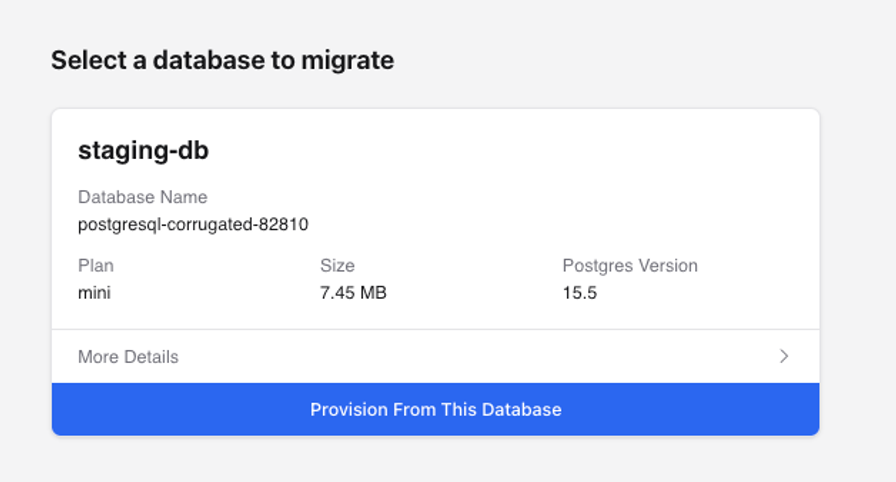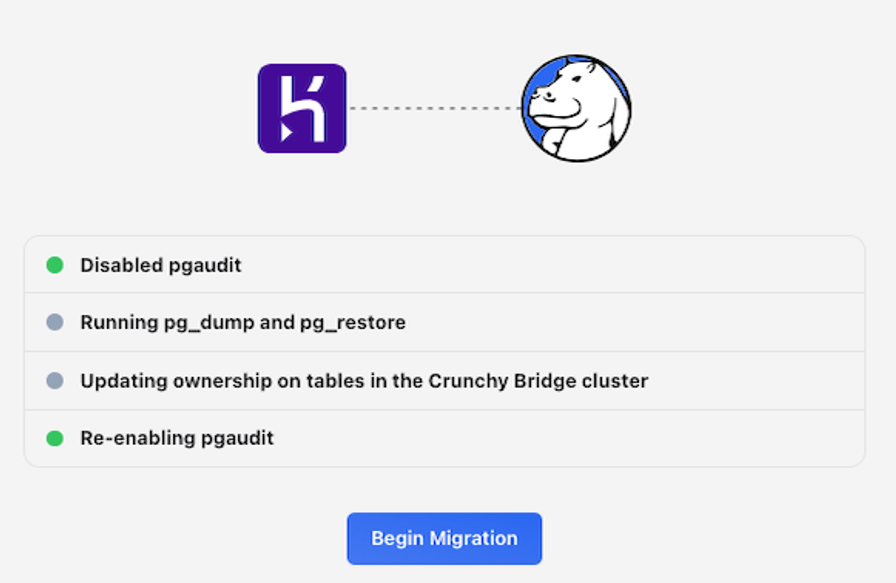Latest Articles
- Hacking the Postgres Statistics Tables for Faster Queries
- OpenTelemetry Observability in Crunchy Postgres for Kubernetes
- Creating Histograms with Postgres
- Introducing Crunchy Postgres for Kubernetes 5.8: OpenTelemetry, API enhancements, UBI-9 and More
- Crunchy Data Warehouse: Postgres with Iceberg Available for Kubernetes and On-premises
Migrate from Heroku Postgres to Crunchy Bridge
4 min readMore by this author
While database migrations are not an everyday thing for you, they are for us.
Migrating to a new database provider isn't something you ever take lightly. Once you've come to the decision that you may want to migrate then you look at the time and effort cost of switching, only to wonder if it's really worth it. You decide it is, and still you're left with uncertainty of what-if:
- What about Postgres versions?
- What about Postgres extensions?
- What about collations?
- How do you minimize cutover time while not spending 6 months doing some custom application double writing?
- What about performance, how do you test to know you'll be safe ahead of time and not immediately put stress on your newly migrated database?
I still recall over 2 years ago when we migrated a multiple TB database from Heroku to Crunchy Bridge in mostly online fashion. Heroku at the time was feeling the pain of managing this database and recommended the customer talk to us. They talked to other (big box) providers, which created plans and processes to help them migrate. Months later, the customer was no closer than when they started. After our team's initial conversation with the customer, we had their multi-terabyte database smoothly migrated just a few months later (entire process included planning on their side and test runs). From that point several years ago we've refined our processes even more, helping people migrate from Amazon, Azure, GCP, Fly.io, Heroku, and other providers, with both as safe and as effortless of a process as possible for you.
Since that first major migration, we've gone from being able to have an initial conversation with someone on a Tuesday to fully migrated, and in production by Friday of the same week. This was with test runs, migrating their staging first, thorough testing. They were motivated to move and we were happy to go as fast as they wanted in this case. I still won't say migrations are trivial, but our customer's experience tends to speak loud and clear.
Today, we're excited to make it even easier with a purpose built tool to help you migrate your database from Heroku to Crunchy Bridge. Our migration tool is intended for smaller databases of under 100GB. For larger databases we still recommend you reach out to us and we're happy to help with that process to ensure high level business continuity throughout the migration.
If you want to get started visit our Heroku DB Migration tool at migrate.crunchybridge.com or feel free to read on and we'll take a look at what it looks like to migrate.
First you'll connect you're via OAuth to your Heroku account, then you'll select the database you want to migrate

To start your migration, you will need to create a new cluster on the Crunchy Bridge side. We recommend you select a similar tier in terms of memory and storage. Many customers find that they are able to downsize their cluster after migration is complete, particularly in terms of memory due to better performance on Crunchy Bridge. You can change your cluster plan at any time.
Once you've selected your plan you're ready to migrate. Go ahead and enable maintenance mode on your Heroku app and begin. The migrate will step by step advance

And within a matter of minutes you'll be all set. Detach your original database, update your app to point to your new Crunchy Bridge database, and scale your app back up out of maintenance mode.
That's it, you've just migrated a database without the pain and stress. Feel free to try staging, do test runs with your production, and if you have any questions please don't hesitate to reach out to us. Just visit migrate.crunchybridge.com to get started.
For any larger databases we're standing by as well and happy to support you through the process to make it as easy on you as possible.
Related Articles
- Hacking the Postgres Statistics Tables for Faster Queries
13 min read
- OpenTelemetry Observability in Crunchy Postgres for Kubernetes
8 min read
- Creating Histograms with Postgres
10 min read
- Introducing Crunchy Postgres for Kubernetes 5.8: OpenTelemetry, API enhancements, UBI-9 and More
4 min read
- Crunchy Data Warehouse: Postgres with Iceberg Available for Kubernetes and On-premises
6 min read